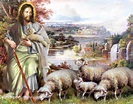The Work at Thessalonica: Part 4 of 4
by John Lowe
(Laurens, SC)

1 Amphipolis was also called “Nine Ways,” which name suggests its importance both strategically and commercially. Most cities are built on the pattern of a square, but this was like a roundhouse and the wall around it was round. It was an important station on the Via Egnatia, a Roman road which was the predominant thoroughfare through that area. It was 500 miles from the Hellespont two Dyrrhachium on the Adriatic by this road. This would be a highway which the Roman army would use. And now here come some missionaries’ on this road going to Thessalonica. Apollonia was another town on this same Egnatian road.
2Thessalonica: in Paul’s day it was one of the great seaports of southeastern Europe, with an estimated population of about 200,000. It was inland but it was a seaport because three Rivers flowed into the sea from there. It was a prominent city of that day, another Roman colony. Its Jewish community appears to have been correspondingly large, certainly so by comparison with Philippi.
3 It was long enough for the church to be established and leadership appointed (1 Thessalonians 5:12). It was of sufficient duration that Paul received financial support from Philippi “time and again” while in Thessalonica (Philippians 5:16). Evidently, he took up his trade and supported himself as well during this period (1 Thessalonians 2:9). Most of Paul’s converts in Thessalonica seem to have come out of paganism, judging from 1 Thessalonians 1:9, which would indicate a more extensive Gentile witness than one might gather from Luke’s highly compressed account.
4 Luke used the terminology of formal rhetoric, the art of persuasion. Paul appealed to the reasoning of the Jews and persuaded them with scriptural demonstrations.
5 That the Scriptures point to the sufferings of Christ is a common theme in Luke-Acts: Luke 24:26, 46; Acts 3:18; 26:22; 1 Corinthians 15:3; 1 Peter 1:11. The servant psalms of Isaiah would have comprised a major part of these Old Testament proofs of the passion of Christ.
6 Prominent women: the Greek could just as easily mean, “wives of the leading men.”
7 Inscriptional: a historical, religious, or other record cut, impressed, painted, or written on stone, brick, metal, or other hard surface.
8 The NIV renders this verse: “But other Jews were jealous; so they rounded up some bad characters from the marketplace, formed a mob and started a riot in the city. They rushed to Jason’s house in search of Paul and Silas in order to bring them out to the crowd.”
9 Diaspora: The body of Jews living in countries outside Israel.
10 Troublemakers: can mean to stir up sedition, be a political agitator.
11 Security here means that they had to post bail, though they had a different name for it.
No content on preachology.com may be printed or
copied to any other site without permission.
|
The Preaching Ezine Subscribe to my free newsletter for monthly sermons and get a free book right now. Just follow the link above and get the details! |
|
Sermon Supply Ministry
Be ready for Sunday…before Saturday night! |
|
Manna Seminary
Did you ever want to start or finish your Ministry Training? |
|
YOUR PAGES: by sharing YOUR great sermons! by sharing YOUR great poems! |



